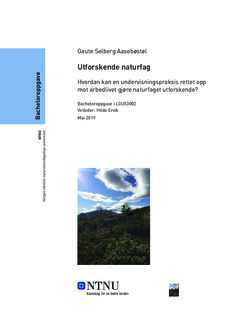| dc.contributor.advisor | Ervik, Hilde | |
| dc.contributor.advisor | Svendsen, Bodil | |
| dc.contributor.author | Aasebøstøl, Gaute | |
| dc.date.accessioned | 2019-08-23T14:06:32Z | |
| dc.date.available | 2019-08-23T14:06:32Z | |
| dc.date.issued | 2019 | |
| dc.identifier.uri | http://hdl.handle.net/11250/2610197 | |
| dc.description.abstract | Denne bacheloroppgaven utforsker hvordan man kan kombinere en utforskende naturfagundervisning med arbeidslivet. Utdanningsvalg får stadig større plass i skolen og det vil være til god hjelp for å gjøre et godt karrierevalg om man kan implementere dette i skolefagene.
I denne oppgaven har jeg gjennom et strukturert kvalitativt intervju fått innblikk i hvordan dette kan løses i praksis, hva som er tanken bak dette og hvilke fordeler og ulemper som dette fører med seg. Selv om intervjuet var strukturert gikk praten løst og naturlige oppfølgingsspørsmål ble stilt for å danne et godt bilde av det som ble formidlet.
Jeg har gjennom problemstillingen kommet inn på sentrale temaer som blant annet forarbeid, gruppearbeid, alternative læringsarenaer, behov for variasjon og hva som motiverer elevene. For å belyse disse temaene har jeg forankret det i teori jeg har følt har vært passende. Jeg benytter meg av kjente læringsteorier som Lev Vygotskij sin sosiokulturelle læringsteori, Jean Piaget sin teori om kognitiv konstruktivisme og Howard Gardners teori rundt de mange intelligensene. Jeg kommer og inn på 5E-modellen, frihetsgrader og naturfagets tre dimensjoner.
Resultatene viser at utforskende undervisning kan kombineres med et fokus på arbeidslivet om det gjøres riktig. Om man klarer det, er det flere fordeler som intervjuobjektet hadde erfart. Blant disse fordelene et at elevene ser verdien i det de holder på med, undervisningen er praktisk anlagt, undervisningen mer variert og elevene motiverte. | |
| dc.description.abstract | This bachelor thesis explores how to combine an exploratory science education with working life. Selection of education are gaining more and more time in schools and will be of great help if we can implement this in other school subjects.
In this thesis I have, through a structured qualitative interview, gained insight into how this can be solved in practice, what is the idea behind this and what advantages and disadvantages this brings. Although the interview was structured, the talk was loose and natural follow-up questions were asked to form a good picture of what was communicated.
Through the thesis, I have addressed key topics such as preparatory work, group work, alternative learning arenas, the need for variation and what motivates the students. In order to shed light on these topics, I have anchored it in theory I have felt has been appropriate. I have used familiar learning theories such as Lev Vygotsky's sociocultural learning theory, Jean Piaget's theory of cognitive constructivism and Howard Gardner's theory of the many intelligences. I also use models such as the 5E-model, the degrees of freedom and the three dimensions of science.
The results show that exploratory teaching can be combined with a focus on working life if done correctly. If you do, there are several advantages that the interviewee had experienced. Among these benefits is that students see the value of what they are doing, the teaching is practical, the teaching more varied and the students get motivated. | |
| dc.language | nob | |
| dc.publisher | NTNU | |
| dc.title | Utforskende naturfag - Hvordan kan en undervisningpraksis rett opp mot arbeidlivwt gjøre naturfaget utforskende? | |
| dc.type | Bachelor thesis | |
